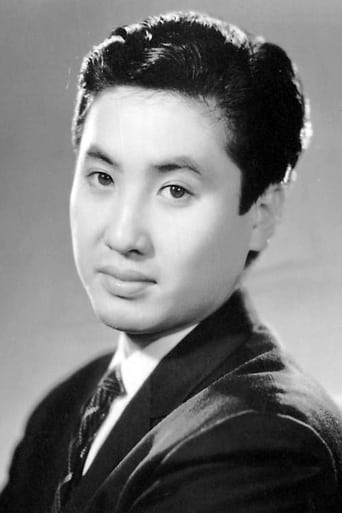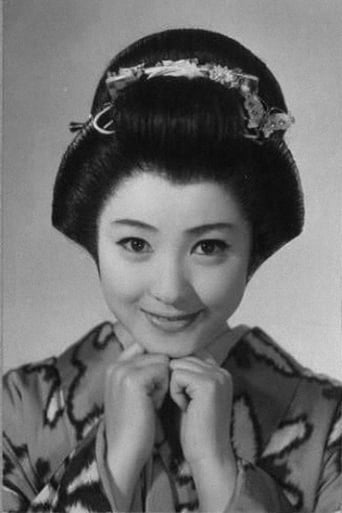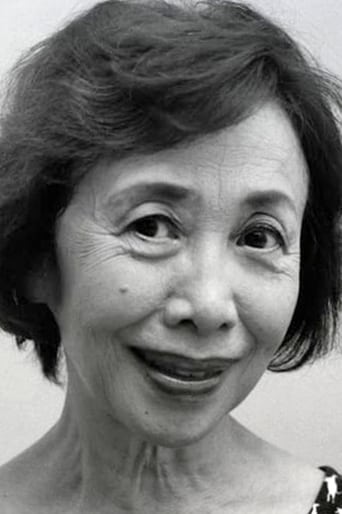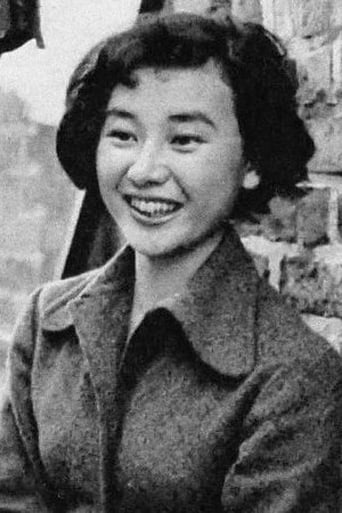filippaberry84
I think this is a new genre that they're all sort of working their way through it and haven't got all the kinks worked out yet but it's a genre that works for me.
Melanie Bouvet
The movie's not perfect, but it sticks the landing of its message. It was engaging - thrilling at times - and I personally thought it was a great time.
Geraldine
The story, direction, characters, and writing/dialogue is akin to taking a tranquilizer shot to the neck, but everything else was so well done.
Billy Ollie
Through painfully honest and emotional moments, the movie becomes irresistibly relatable
WILLIAM FLANIGAN
Viewed on DVD. Subtitles/translations = eight (8) stars; restoration = seven (7) stars. Director Tadashi Imai (and his film- creation colleagues) have walked a fine line between reality and audience-conditioned violent expectancies. The approach taken seems to be one of extracting narrative guidance from historical documents published in the 300-400 years prior to the onset of the 20th Century and the full modernization of Japan. Romanticized fiction of the samurai warrior class and its codes of conduct as popularized in historical/modern novels and, especially, motion pictures (shades of the fictionalized American Old West!) has been studiously avoided. The result is a film with a lot of talk (a bit too much) and very little (or no) sword-swinging action (except for wooden sticks). Sword welting is pretty much limited to murdering uppity peasants, committing suicide on the battlefield (to avoid capture), and the entertainment of sadistic and corrupt, but wealthy, feudal lords. Samurai conduct codes are realistically shown to depend on the customs of each feudal clan with samurai depicted as following the money trail with their allegiance switching from one feudal clan/domain to another sometimes in the midst of fighting. (It is to be noted that: (1) few samurai actually died in direct sword-to-sword combat--perhaps less than 10% overall--when employed to defend a feudal lord/clan; (2) no unified, national samurai code of conduct EVER existed in old Japan; and (3) author Inazo Nitobe invented samurai Bushido in his internationally-popular 1899 small book--"BUSHIDO Samurai Ethics and the Sole of Japan"-- published (in English) well after samurai had moved on to other pursuits (like business, finance, and writing). (Nitobe's volume proved also to be domestically popular, especially with Japan's military and business cartels.) Acting is fine, with the male lead playing seven roles in seven historical epochs (it would have been even more interesting if the same actress had played seven roles!) Cinematography (wide screen, black and white) is good. Set lighting is a bit on the dark side (perhaps to hide cheap set designs for historical periods?). Costuming "cries out" for color photography (maybe this process lay beyond the production budget?) Film score is fine. Restoration is great. Subtitles are exceptionally good. All opening credits are translated! Historical information (especially the identity of original-source information) is summarized in white letters at the top of the screen. Dialog subtitles appears at screen bottom in yellow and (if more than one character is speaking) simultaneously in gray. (An excellent technique.) Subtitles are also, for the most part, kept to a minimum and remain on-screen long enough to be fully read (no easy feat given the dialogue-heavy nature of the film). Further, yellow subtitles often remain while the gray ones emerge to help provide a seamless transition in line readings for the viewer. (Historical information flow and subtitles can be selectively turned off.) The DVD menu is very poorly designed, and exceptionally hard to navigate. To see if an intended selection has been made, the viewer practically needs to put her nose against the screen! A samurai movie for grown ups. WILLIAM FLANIGAN, PhD.
mevmijaumau
Well, I think I've found a movie which beats those Italian exploitation films in the number of alternative titles; get this, the movie is usually known as Cruel Tale(s) of Bushido, but also went under the titles Bushido Samurai Saga, Cruel Stories of Samurai Ways, The Oath of Obedience, Bushido: The Cruel Code of the Samurai, Stories of Samurai Cruelty, or simply Bushido.It was directed by Tadashi Imai, who specialized in directing social indictment films. This one in particular and Revenge (1965) were part of the zankoku jidaigeki (cruel jidaigeki) subgenre of films, a subgenre which crossed film noir with samurai films, portraying a dark world of doomed souls, of corruption, cruelty and raw emotions. Probably the most famous zankoku jidaigeki film is Masaki Kobayashi's Harakiri (1962). Tadashi Imai was also forced to do propaganda films during wartime, under threats of being sent to the front. Later he became an outspoken critic of the military, active in Communist politics.Cruel Tales of Bushido, based on Norio Nanjo's novel, is a story about a contemporary salaryman whose wife-to-be attempts suicide and he reflects on his bloodline's tragic past. After we find out that each of the ancestors sacrificed themselves pointlessly in some way to their lord, he comes to the realization that nothing has changed in Japanese society, and that now he's a slave to his company just as how his ancestors were slaves to feudal lords. It's not exactly subtle, actually it's completely confrontational and harsh, but it's always interesting to follow.This movie features some actors you may know from other Japanese films, like Kyoko Kishida from Woman in the Dunes, but the two prominent ones are Kinnosuke Nakamura and Masayuki Mori, who, Blackadder style, appear in each generation as the exploited family member and the cruel lord, respectively. Nakamura is especially excellent because all of the characters he plays have a completely different presence and you forget it's the same actor. The stories range from Edo period to 60s Japan, focusing on everyone from samurai to kamikaze pilots, and are usually connected with the ninjo-giri dilemma (the clash of duty and humanity).The B&W photography is incredibly dark, as is to be expected from films of this genre. There are barely any light sources and the characters are lined up perfectly geometrically, so that every corner of the frame is always occupied by at least one actor, with Masayuki Mori always at the center of the frame.The movie is very brutal and uncompromising, but it has sort of an uplifting final scene. All in all, it's one of the most underrated samurai films I know of. I'm really looking forward to seeing more films from the zankoku jidaigeki subgenre.
MartinHafer
This DVD is from AnimeEigo--an excellent company because they often provide explanatory notes as a Japanese film progresses in order to help the viewer to understand the context for what is occurring. However, this film was not chock full of these explanations. This was okay for me, as I understood the references to Ronin, belly slitting, etc., but a viewer not already familiar with samurai films might feel a bit lost--even with the explanatory notes.This film starts off in an unusual manner for a samurai film. It begins in the present and a man has been summoned to the hospital after his girlfriend attempted suicide. You are not sure why this occurred. Then, the young man begins to think about about seven generations of samurai from which he was descended.The saga begins with a Ronin--a masterless samurai who was finally given a position with a clan. Starting with him and going though successive generations, the men all pledge their complete loyalty to their lords--a requirement of the code of Bushidô. And, in each case, their loyalty is rewarded with a complete lack of faith by the lords. One of these samurai this raped and castrated, several are forced to kill themselves, one has his wife raped and he is set up to kill his own daughter by mistake--the list of atrocities goes on and on. Yet, despite this, their children continue the tradition of absolute loyalty and respect. The lack of fairness of this system is jarring.This is a very interesting samurai film, as most others seem to glorify this feudal system. This one, in contrast, exposes how selfish and unjust it actually could be. This is not without precedent, as films like "Samurai Rebellion" and "The 47 Roniin" also talk about unjust decisions by the lords. But, these two other films deal with specific injustices--not an intergenerational problem that repeats itself for hundreds of years! So, instead of saying the other films were aberrations, "Bushidô.." seems to say the entire structure of their society was wrong and does NOT look back at it with the usual nostalgia of other Japanese films of the genre. In fact, it then goes on to show the link of this code to the Japanese involvement in WWII--blind obedience by the nation even though the cause was unjust. And then, to the modern allegiance a worker feels to their company--an allegiance that supersedes right and wrong (just like the samurai). Because of broaching this topic in such a systematic and thorough manner, this film is impressive--very impressive. However, I am pretty sure the public must have been quite shocked by this message. It was very well said in the film as one of the children of these wronged samurai says "The lives of the samurai are not their own--they belong to their Lord".My only problem with this film is that there simply is too much material for one film. It would have been best done as a mini-series--allowing each generation more time to be fully developed. But, this is a small complaint in an otherwise exceptional film. Another small problem is the WWII Kamikaze sequence, as the films are clearly NOT WWII vintage. But, as most all the Japanese planes had been used up in the war, their using more modern (and rather insignificant) planes could be understood.By the way, Kinnosuke Nakamura played the roles of successive generations in this film. This was pretty interesting and considering the makeup and costumes used, it worked well.By the way, for the more tender-hearted out there, there is a brief scene of a hare being killed and it appears real. Just be aware of this, as some might not wish to see this. However, there is A LOT of goriness and death in this film, so be forewarned regardless.
worry-wait
(At first, sorry for my poor English.) I should confess about this movie, yes, I watched this movie by mistake. I thought "Bushidô zankoku monogatari" was action movie. This movie is about samurai, but there is almost no action. There is a cruel system of society.During about 7 generations, a samurai family has shown their loyalty to their bosses. Even the time is changed, the boss is changed, but their loyalty isn't changed - because the system which eat up the loyalty of followers isn't changed."Bushidô.." tell us the the 'modern' times is just a illusion. Boss-follower system has always been everywhere-every time and has dominated us. And even the system has hypnotize us the loyalty is precious for public, social society. Even the modern times is not modern, just a same old crap for sustain the system of sucking-loyalty-monsters. "Bushidô.." is not just about Japan. It's about all illusions of system, modernity and loyalty. So, this movie is one of my best "horror" film. (just a half joke)





